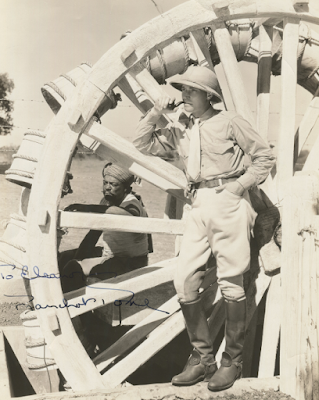Ok, on to the record...
When I Google his address, all that gets returned is the alternate address of 470 Layton Way in Los Angeles, a plantation-style mansion designed by architect John Byers for wealthy Phillip Ilsley, who lived in it beginning in 1937. Actor Wayne Morris and his wife Leonora "Bubbles" Hornblow lived there after their marriage in 1939, but divorced soon after in 1940. I don't know how Franchot could've lived in this house at the time, logistically, but with its immaculate landscaping (it included a waterfall, tennis court, and pool) it certainly seems like the type of house Franchot might occupy, short or long term. It is probably that Google is leading me in the wrong direction since a lot of streets change over time. When he registered to vote the same year, Franchot listed his address as 10333 Wilshire Boulevard. 1940 was an interesting year for Franchot. He was fresh from his recent return to the stage and only made one film that year, the western comedy Trail of the Vigilantes. He was single and seen around town with many gorgeous and talented Hollywood ladies (including Carole Landis and Olivia deHavilland) during that time. My point is that he was playing the field in romance and his career at the time, so it is very likely that he was also not settled in one residence or another.
He lists his father as a further contact and places his father at the family home on Buffalo Avenue in Niagara Falls, New York.
 On the Registrar's Report side, we get a physical description of Franchot. With mostly black and white photos available, you may have wondered about the color of his eyes...they are hazel, his hair brown, and his complexion light. He's just shy of 6 feet tall and weighs 160 pounds. A kidney scar is listed as another identifying body marker. Franchot seemed to have major kidney issues. I'm not sure if this was a medical issue independent of his drinking habit or due to it. In his book, Elia Kazan makes mention of Franchot having an issue with his kidneys (and with drinking binges) as early as the Group Theatre days of the early 1930's. I am not sure when Franchot acquired the scar, but he had additional medical issues from 1938 to 1941.
On the Registrar's Report side, we get a physical description of Franchot. With mostly black and white photos available, you may have wondered about the color of his eyes...they are hazel, his hair brown, and his complexion light. He's just shy of 6 feet tall and weighs 160 pounds. A kidney scar is listed as another identifying body marker. Franchot seemed to have major kidney issues. I'm not sure if this was a medical issue independent of his drinking habit or due to it. In his book, Elia Kazan makes mention of Franchot having an issue with his kidneys (and with drinking binges) as early as the Group Theatre days of the early 1930's. I am not sure when Franchot acquired the scar, but he had additional medical issues from 1938 to 1941.Just before his 33rd birthday, in 1938, doctors advised the ailing actor that "rest, strict diet and avoidance of all exercise" were "essential" to recovery of a non-disclosed, serious illness.
On July 24th, 1941, not even a full year after this draft card was completed, Franchot was stricken by extreme pain and had to undergo an immediate "major abdominal operation" at Good Samaritan Hospital. Following the operation, the Los Angeles Times reported that Franchot was "as good as can be expected." If the draft record had been completed in October 1941, the identifying body markings field would indicate an additional scar from that operation.
On September 9, 1941, the Los Angeles Times reported that Franchot had recently recovered and was no longer hospitalized. It said he was set to begin filming of Eadie was a Lady with Rita Hayworth and John Hubbard, a project that did not come to fruition. (Eadie was a Lady would be released in 1945 starring Ann Miller, Joe Besser, and William Wright.)
Despite completing his draft card immediately after the Selective Training and Service Act of 1940, Franchot did not serve in World War II. The records do not indicate which draft classification he received, so I am not sure if he was deferred for any reason or why he did not serve.
Franchot—who would marry Jean Wallace in 1941 and start a family—was a prominent war bond seller across the country, served on charitable committees and entertained the troops. I will write about his contributions on the homefront in another post.
Sources:
- Clippings. The Los Angeles Times. July 5, 1937; February 11, 1938; July 26, 1941; September 9, 1941.
- Fold3: https://www.fold3.com/title/816/wwii-draft-registration-cards
- Kazan, Elia. Elia Kazan: A Life. New York: Knopf, 1988.
- Paradise Leased: https://paradiseleased.wordpress.com/2011/01/03/lost-hollywood-a-swimmingly-grand-estate-in-brentwood-heights/
- "Tone Undergoes Major Operation." Los Angeles Times. July 25, 1941.







